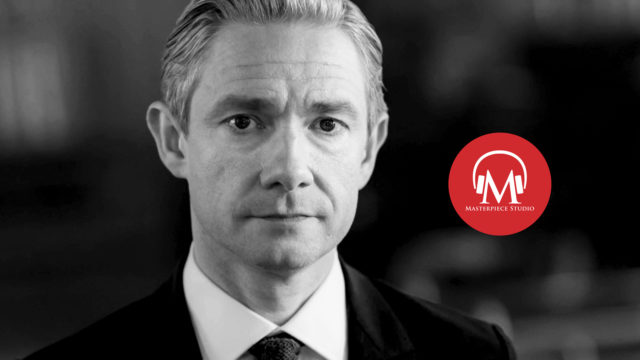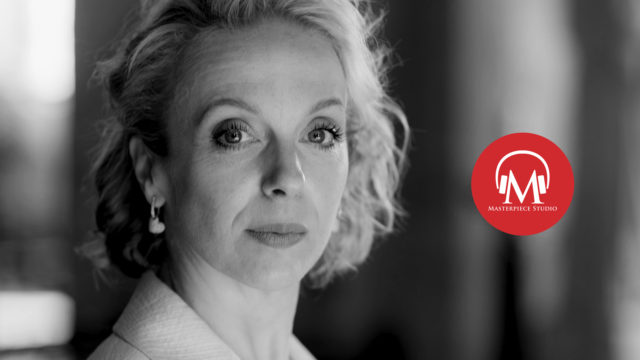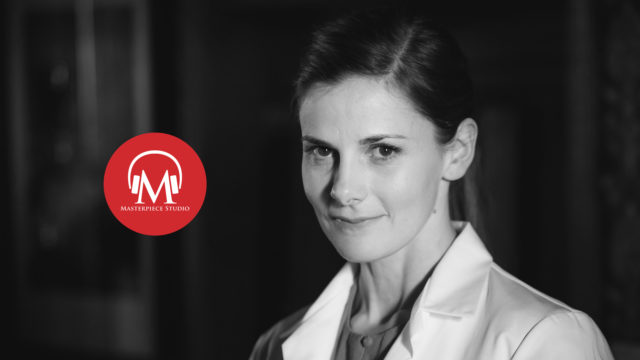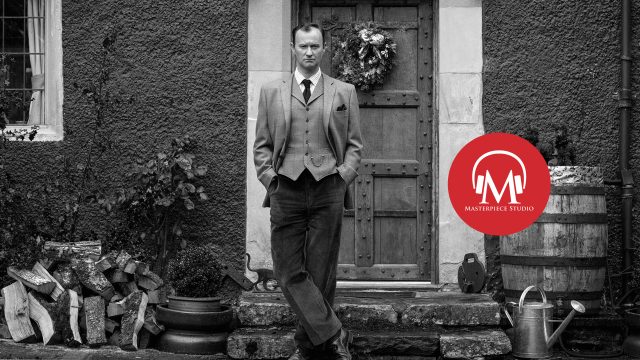Sherlock co-creator, writer and actor Mark Gatiss previews the upcoming special, “The Abominable Bride” starring Benedict Cumberbatch.
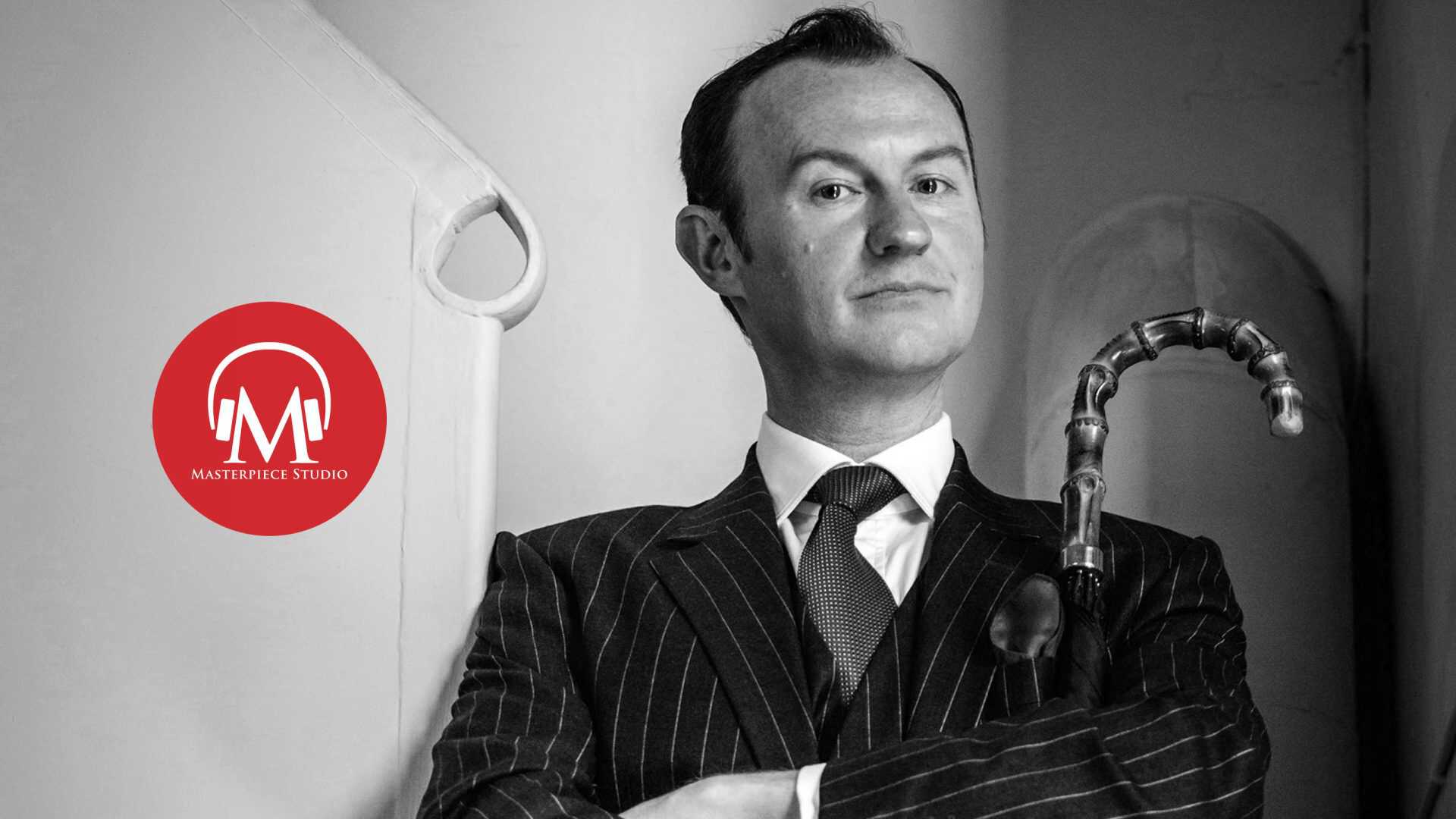

Sherlock’s Mark Gatiss
Released --:--
Download and subscribe on: iTunes | Spotify| RadioPublic
Transcript
Jace Lacob (Jace): MASTERPIECE Studio is brought to you by Audible — Stories that Surround You. I’m Jace Lacob and you’re listening to MASTERPIECE Studio.
You might know the address — 221B Baker Street — but you definitely know the name: Sherlock Holmes. The impossibly gifted, pipe smoking detective has been solving mysteries since 1887 when he first appeared in the story A Study in Scarlet, written by Sir Arthur Conan Doyle.
Fast forward to today and you get Mark Gatiss and Steven Moffat’s Sherlock, a fresh take on the story set in the 21st century.
They’ll be giving this modern adaptation a surprising twist in the upcoming special — The Abominable Bride — which takes Benedict Cumberbatch’s Sherlock Holmes back to the Victorian era.
CLIP:
Mark Gatiss: It’s been a very interesting exercise in reverse engineering because all the things we had to do originally to make the Victorian 21st century, we’ve had to retrofit now to go backwards.
Jace: That’s Mark Gatiss, who joins us this week to talk about the new Sherlock special, premiering Jan 1st on MASTERPIECE Mystery.
CLIP:
Mark Gatiss: The word for the special is ghosts.
Jace: In addition to writing and executive producing the series, Mark stars as Sherlock’s brother, the cynical, calculating, and — perhaps smarter — Mycroft Holmes.
CLIP:
Mycroft Holmes: If you seem slow to me, Sherlock, can you imagine what real people are like? I’m living in a world of goldfish.
Jace: Thanks so much for joining us today, Mark.
Mark Gatiss (Mark): Not at all, thanks for having me.
Jace: So the trailers for The Abominable Bride feature mysterious hooded figures and a lot of talk of ghosts — is this your take on gothic horror?
Mark: Yeah! It’s got…it’s literally everything. It’s got almost every bit of Gothic horror we could think of. It’s a treat. It’s a treat and a special in every sense, you know? And there’s a lot of horror in Sherlock Holmes. Actually, it’s a funny thing. We haven’t done a lot, I mean, “Baskerville” being like a kind of modern ghost story in that way was a sort of version of that. But there’s a lot… there’s a scarlet thread through the original of sort of voodoo and weird secret societies and slightly odd things like that. But I like to bring that out obviously because I’m a huge horror fan. And doing a sort of hyper Gothic treat like this for Christmas, it’s like a sort of… it’s like a brandy pudding on fire.
Jace: The Abominable Bride comes from the Sherlock Holmes short story “The Musgrave Ritual,” which mentions Ricoletti of the club foot and his abominable wife.
Mark: That’s right.
Jace: And it has Holmes and Watson sorting through some old case files. Is there a clue to be found there for the special?
Mark: No, no. It’s just that reference. I mean, it’s essentially a Christmas ghost story. We’ve gone back in time for one episode. I mean, not literally, the characters don’t go back in time. “The Abominable Wife” was just one of those wonderful little references. So Ricoletti’s in it, and it’s his bride is the protagonist, but it’s otherwise a new story.
Jace: Well, we’ve got that white-faced Victorian bride with the pistols that we see in the trailer.
Mark: That’s right. I would hazard a guess that that’s the abominable bride.
Jace: Is there any chance we might see another Victorian-era Sherlock?
Mark: Oh, no, I don’t think so. I mean, it is a special. I mean, the thing is, in a way, it started as a joke. We joked years ago about it, but we’ve joked that we might do one in black and white where they fight the Nazis.
Jace: I would actually love that. I’d love to see that.
Mark: Oh, so would I.
Jace: Let’s set the scene a little. You’re on a train, heading to the Dr. Who set in Cardiff. Is this where the idea for Sherlock first began to germinate?
Mark: Yes, it was. Steven Moffat and I were… we were working on Dr. Who together, and we often seemed to end up getting the same trains back and forth to Cardiff. And we were talking about other things we loved — James Bond and Sherlock Holmes and various things. And I said, “Isn’t it odd that the first story, A Study in Scarlet, Dr. Watson is invalided home from war service in Afghanistan?” And we were currently in the middle of another Afghan war, and I said, “Yeah, it’s the same war, isn’t it?” And we looked at each other and we sort of light bulb moment of, “You know, we should do that again, why don’t we just bring it up to date?” And as soon as we had the idea, we spent the rest of the journey just sort of full of the possibilities of just doing it in the present day.
Jace: Now, you and Steven Moffat have stated that casting Benedict Cumberbatch was essentially easy. What was it about him that made him the ideal candidate to play Sherlock Holmes?
Mark: Oh, he gave us lots of money. In a brown envelope. Well, they… it’s just one of those things. I think sometimes, you know, there are sort of two or three James Bonds you could imagine. Sometimes, there’s just one person who’s in the ether, and he was sort of perfect. He looked right, he had the right sort of credentials, he’d done a lot of great theater work and the sort of TV presence, but not in any way a star. It just seemed to fit. And particularly because he had, the only man in the world who has a name sillier than Sherlock Holmes, so that was our deciding factor. But then he came in to read with me, and it was just easy. It was just he’s the natural…he is it, he’s our Sherlock Holmes.
And then we had to spend more time trying to find a natural Dr. Watson for him, but as soon as Martin and Benedict read together, Steve leaned over to me and said, “There’s the show.” And it was obvious just the chemistry was there, straight away, and we didn’t have to look back from there.
CLIP:
Dr. Watson: Are you wearing any pants?
Sherlock Holmes: No.
Dr. Watson: Okay.
Dr. Watson: We’re at Buckingham Palace. I’m seriously fighting an impulse to steal an ashtray.
Dr. Watson: What are we doing here, Sherlock? Seriously, what?
Sherlock Holmes: I don’t know.
Dr. Watson: Here to see the queen?
Sherlock Holmes: Apparently yes.
Mycroft Holmes: Just once, can you two behave like grown-ups?
Dr. Watson: We solve crimes, I blog about it, and he forgets his pants. I wouldn’t hold out too much hope.
Sherlock Holmes: I was in the middle of a case, Mycroft.
Jace: In addition to co-creating and writing Sherlock, you also play Mycroft Holmes. Do you ever find it challenging to write for yourself?
Mark: Oh, it’s a breeze, I just give myself the best lines. That’s the way to do it. I did… I resisted a bit. I mean, in “Hounds of Baskerville,” I’m only in one shot where I just roll my eyes at Sherlock’s activity. And I kind of got over that now. I don’t mind. The big thing is if I change my mind about a line, I can just change it without actually having to ring anybody up. “I think Mycroft might say this now,” I’ll say to myself. Then I’ll ring myself, I’ll ring myself up and then nod it through and then do it, yeah.
CLIP:
Mycroft Holmes: Don’t be smart.
Sherlock Holmes: That takes me back. “Don’t be smart, Sherlock. I’m the smart one.”
Mycroft Holmes: I am the smart one.
Sherlock Holmes: I used to think I was an idiot.
Mycroft Holmes: Both of us thought you were an idiot, Sherlock. We had nothing else to go on, until we met other children.
Sherlock Holmes: Oh yes, that was a mistake.
Mycroft Holmes: Ghastly. What were they thinking of?
Sherlock Holmes: Probably something about trying to make friends.
Mycroft Holmes: Oh yes, friends.
Jace: Mycroft and Sherlock seem forever stuck in a high stakes case of sibling rivalry. Why do these two continue to torment each other so?
Mark: It all comes from the right place with Mycroft because he doesn’t want him to be just a sort of rogue agent. He obviously finds the idea that his brother is a private detective embarrassing. He wants to… you know, with a brain like Sherlock’s, he should be working for him. That’s where it comes from.
Jace: One of my favorite moments, actually, between the two of them is in “The Final Vow,” when Mycroft admits of Sherlock’s possible death that he says, “It would break my heart.”
CLIP:
Mycroft Holmes: This isn’t agreeing with me. I’m going in.
Sherlock Holmes: You need low tar. Still smoke like a beginner.
Mycroft Holmes: Also…Your loss would break my heart.
Sherlock Holmes: What the hell am I supposed to say to that?
Mark: But then you must remember he has just been drugged, and he doesn’t realize it. So whether he means it, I played it slightly puzzled, as if the words had just come out slightly unbidden, you know? Because I don’t know if that’s the drug talking or whether it’s actually how he feels. I don’t think we’ll ever know.
Jace: Along those lines for both Sherlock and Mycroft, how do you walk the fine line between having Mycroft be human and having him be godlike?
Mark: Oh yeah, that’s a very good point because, you know, this is a… it’s something that Doyle encountered all the time with Sherlock himself. You make great play of how brilliant he is, but then if he’s so brilliant, he’d solve the crime immediately. I mean, he backtracks from…you know, in the first story, I think Sherlock says, “Occasionally I have to leave the flat, but I solve most of them in an armchair.” Which sounds great until you actually want to write a series of short stories, in which case it wouldn’t be very interesting.
So in a same way with Mycroft, and the power of the Secret Service, and this sort of dark government that he pulls the strings on, you have to sort of have ebb and flow in order for a story to develop. But yeah, that’s a very good point, that, because omniscience isn’t very interesting. It’s the reason why Superman has kryptonite. You have to have something, otherwise it would just be godlike and there would be no drama. So you need to have occasional moments of confusion or lack of intelligence, really.
Jace: So is Sherlock Mycroft’s kryptonite, then?
Mark: Oh, that’s a very good point. Yes, he is, I think he is.
Jace: With three seasons and a special under your belt now, how would you say that Sherlock has evolved as a series?
Mark: The Sherlock we meet at the beginning of the stories is not the same man at the end. He does become better at being like a human being. That doesn’t mean he is a human being, but he is better at doing it, and he learns that from his association with Dr. Watson, and from being just, I suppose, more in the real world, and actually having a friend, even if it’s only one, a friend who means the world to him.
Jace: Every sociopath needs a best friend, apparently.
Mark: Well, I certainly do.
I’ll tell you what we did do. We really nearly did this. In “The Sign of Three,” the wedding episode, we were going to have a thing where John finds Sherlock’s notes for the wedding, and they’ve all been annotated with, like, strange hieroglyphics, little letters. And he thinks… he doesn’t know, he thinks it’s just his best man speech. And eventually he discovers that it says things like “CH,” and it means “cry here.” And the entire thing has just been engineered for effect. But we thought it was too cruel. But actually, it’s kind of what… you know, that’s what Sherlock would do. He would approach the best man speech like a case, that’s what he’s done. He’s right, “This is how I’ll do it, and this will work, this will do the job,” you know?
Jace: What have you and Steven learned from the experience of making the show so far?
Mark: I suppose we’ve learnt… not that we needed to relearn it, but the importance of following your passion project. You know, the reason I think that people love our show is because you can tell that we love Sherlock Holmes. There’s nothing cynical about it. It’s not just like a, “Oh, let’s update it for the sake of it.” It’s like, we love the original, and we worship Conan Doyle. He was a genius writer. So took the idea of sort of bringing everything we loved about them into the 21st century is a passion. So I think it teaches you to go with your heart against… you know, there was a resistance initially to the notion. People thought it wasn’t…there was no point, you can’t do it without Hansom cabs and gas lamps, et cetera. So it’s good to learn that.
Jace: Is there a specific Sherlock story that you love more than others?
Mark: Well, I read “The Adventures” first, the first collection, which are still my favorites. That’s “A Scandal in Bohemia” to “The Copper Beeches.” My overall favorite is called “The Bruce-Partington Plans,” and it’s actually one of the cases in episode three, in “The Great Game,” which is the man who’s actually… his dead body has been placed on the top of a Tube train, and it’s got, you know, submarine plans and everything and German spies. It’s wonderful.
Jace: Now, this is a bit like choosing between your children, but is there a favorite episode of yours so far?
Mark: I think maybe “The Great Game,” actually. I liked…I mean, they were hell to come up with, but having five little cases, I found that very exciting, because it’s against the clock and against the bomber, the idea he has to solve them very quickly, I found that very stimulating.
And then obviously, the swimming pool scene has passed into legend. In fact, that’s all that people ever talk about. The rest of the episode could have been dead air, apparently. (laughs)
Jace: What is it that keeps people so invested in this show?
Mark: Well, I hope because it’s good, and I think…One of my great writing heroes is Wilkie Collins, the great Victorian novelist, and written over his desk was the legend, “Make them cry, make them laugh, make them…wait.” And I think that holds as true today as it always did. And I think there’s… in an age of attention deficit disorder and instant gratification, it proves that you can still do it and people will wait. I mean, they fulminate against it, of course. And actually, it is longer than we’d all like, but it’s kind of worked out fine. And actually, you know, we come back for three weeks and then we go again. And it’s an eternity, of course it is, but as Wilde said, “The suspense is killing me. I hope it will last.”
Jace: Mark Gatiss, thank you so much for joining us today.
Mark: My pleasure. Thank you very much.
Jace: Sherlock: The Abominable Bride premieres in just a few weeks on New Year’s Day. Watch it on PBS and on the MASTERPIECE website.
On the next MASTERPIECE Studio, the cast of Downton shares what they think you should be most excited about for season 6.
CLIP:
Jim Carter: There might be thousands of wedding bells but of course you’d have to kill me to get that information out of me. Everything is possible. Be prepared.
Jace: MASTERPIECE Studio is hosted by me, Jace Lacob, and produced by Nathan Tobey and Kathy Tu. Rachel Aronoff is our production coordinator. The executive producer of MASTERPIECE is Rebecca Eaton.
You can find this podcast at pbs.org/masterpiece and on iTunes. Follow us at Facebook.com/MasterpiecePBS and on Twitter @MasterpiecePBS. And find me, Jace Lacob, on Twitter @Televisionary.
MASTERPIECE Studio is brought to you by Audible. Sponsors for MASTERPIECE on PBS are Viking River Cruises, Audible, and The MASTERPIECE Trust.
That’s the one, that’s it!
Sherlock Podcasts 4 More Podcasts
MASTERPIECE Newsletter
Sign up to get the latest news on your favorite dramas and mysteries, as well as exclusive content, video, sweepstakes and more.











